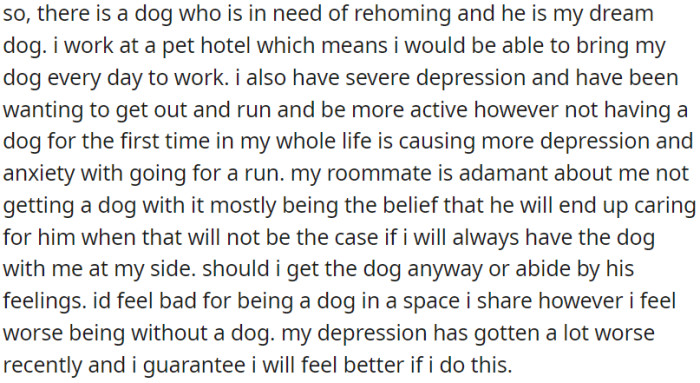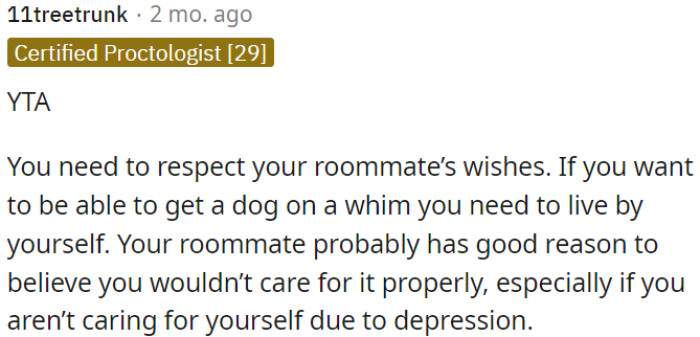Redditor Wants To Get A Dog Despite Roommate's Wishes Because He Believes It Would Cure His Depression
Life often unfolds in a series of decisions that challenge our emotions deeply. Like OP, when he finds himself facing such a crossroads as he contemplates the prospect of adopting a furry friend into his world.
At the heart of this narrative lies a dog in search of a new home, a dream canine companion whose presence stirs a complex interplay of feelings and obligations. Working in a pet hotel comes with its own set of advantages, the most notable being the chance to forge an unbreakable bond with a loyal canine companion.
This rare opportunity seamlessly aligns with OP's yearning for companionship—a staunch ally to stand by him on his journey to conquer profound depression and embrace a more active lifestyle. Nevertheless, the scenario takes an intriguing turn as a concerned roommate enters the fray, firmly opposing the notion of adopting the dog.
His concerns are rooted in the fear that the weight of responsibility could inevitably shift his way. OP stands by his conviction that his new four-legged friend would accompany him ceaselessly, thus alleviating any potential burden on the roommate.
The question of whether to embrace adoption or withhold it now encapsulates a dilemma that echoes the timeless clash between personal aspirations and respect for others. The individual's fervent longing for solace and companionship finds itself at odds with the potential strain that might befall their shared living space.
OP starts:

OP needs to respect his roommate's preferences

Co-habiting means agreeing together on adding pets to the home

Understanding Depression and Pets
Dr. Rachel Kim, a clinical psychologist at the University of Pennsylvania, explains that pets can significantly influence mental health and emotional well-being.
Her research indicates that animal companionship can provide emotional support and reduce feelings of loneliness, particularly in individuals struggling with depression.
In this case, the desire to adopt a dog reflects a hopeful strategy for improving mental health and combating feelings of isolation.
The Role of Pets in Mental Health
Pets can play a significant role in enhancing mental health, providing companionship and emotional support. According to Dr. Ramani Durvasula, a clinical psychologist, "The bond between humans and animals can significantly reduce feelings of loneliness and depression." She emphasizes the importance of realistic expectations when considering pet ownership, especially during challenging times. In this case, the individual believes that getting a dog would alleviate their depression, which speaks to the therapeutic potential of animals.
Equal lease, equal pet says

Shared space, no dogs without mutual agreement

If having a dog is crucial, OP needs to consider finding a new living arrangement.

However, it's essential to understand that while pets can bring joy and companionship, they also require responsibility and care.
Studies in the Journal of Clinical Psychology suggest that introducing a pet into a home can sometimes add stress, especially if the individual is already struggling with mental health issues.
This highlights the importance of assessing one's capacity to provide the necessary care before making such a significant commitment.
Dr. Amanda Brown, a psychologist specializing in animal-assisted therapy, emphasizes that while pets can provide comfort, they also require significant care and responsibility.
Her research indicates that the decision to adopt a pet should be made with careful consideration of one's emotional and practical capacity.
In her opinion, while pets can help improve mental health, they should not be viewed as a sole solution to depression.
The desires of OP should not become a source of stress for the roommates; it is unjust to anticipate him to adjust to those desires.

If a roommate is against having a dog, OP must either respect his choice or find new housing if having a dog is non-negotiable.

Getting a dog without a roommate's permission when you live together makes OP the ass...e

Exploring Alternatives for Mental Health
There are numerous ways to address depression that don't involve pet ownership, which may be more manageable for some individuals.
Therapists often recommend engaging in activities such as exercise, mindfulness, or connecting with support groups as effective strategies for improving mental health.
Research indicates that these approaches can provide significant benefits without the added responsibilities that come with pet ownership.
Expectations vs. Reality of Pet Ownership
Many individuals hold idealized views of how pets can change their lives, especially regarding mental health.
Research shows that while pets can provide benefits, they also come with challenges that can contribute to stress.
This can create a disparity between expectations and reality, leading to disappointment if the pet does not fulfill the anticipated role in alleviating mental health issues.
In this scenario, the individual may need to reflect on their expectations to ensure they are realistic.
Having a roommate involves sacrifices and compromises for mutual comfort

Household harmony requires everyone's cooperation

OP has to respect the roommate's wishes

Practical recommendations include assessing one's mental health and lifestyle before deciding to adopt a pet.
Individuals should consider reaching out to a mental health professional for guidance on coping strategies that suit their needs.
Exploring volunteer opportunities at animal shelters can also provide the benefits of animal companionship without the long-term commitment of ownership.
To navigate these expectations, it may be beneficial to engage in discussions with mental health professionals about the role of pets in emotional well-being.
Additionally, considering other coping strategies, such as therapy or support groups, can provide a more well-rounded approach to managing depression.
Understanding that pets can be part of a broader strategy for mental health can lead to more sustainable outcomes.
In the middle of wanting something and considering what's fair for everyone, a different way of thinking comes into view. Even though getting a dog might seem like a good solution for feeling better, it's important to think about how everyone feels in the place where you live.
Considering your roommate's worries is important. Sharing a place means being considerate of each other's feelings. Even if you say you'll take care of the dog, having a dog in a place where someone doesn't want it can cause problems and create an uncomfortable atmosphere.
If the desire for a pet remains strong, perhaps considering finding a new place to live where pets are welcome could be an idea. This could make everyone happier— you with your pet and your roommate without the stress of having a pet they didn't want.
Psychological Analysis
This situation reflects a common misconception about the role of pets in managing mental health. While pets can offer comfort and companionship, they also require significant commitment and care. It’s essential for individuals to approach pet ownership with a balanced view, recognizing both the benefits and responsibilities involved.
Analysis generated by AI
Analysis & Alternative Approaches
Recognizing the complexities of pet ownership in relation to mental health is vital for making informed decisions.
Research indicates that while pets can offer emotional support, they should not be seen as a cure-all for mental health issues.
Incorporating various strategies for managing mental health can lead to more effective and lasting improvements.
Psychological Analysis
This situation reflects a common struggle for those battling depression, where the desire for companionship can sometimes overshadow the practical aspects of pet care.
Recognizing the responsibilities involved is essential for making informed decisions about mental health strategies.
Analysis generated by AI
Analysis & Alternative Approaches
In summary, while pets can offer substantial emotional benefits, it's crucial to evaluate one's readiness for the responsibilities they entail.
Research consistently shows that mental health interventions can take many forms, and exploring various options can lead to better outcomes for individuals struggling with depression.



